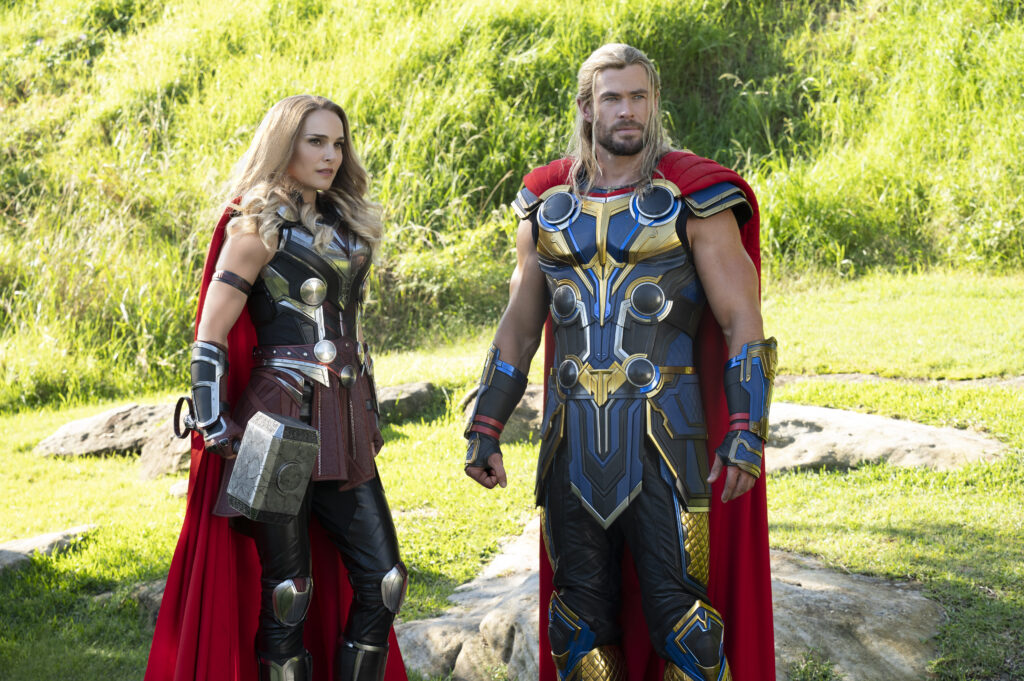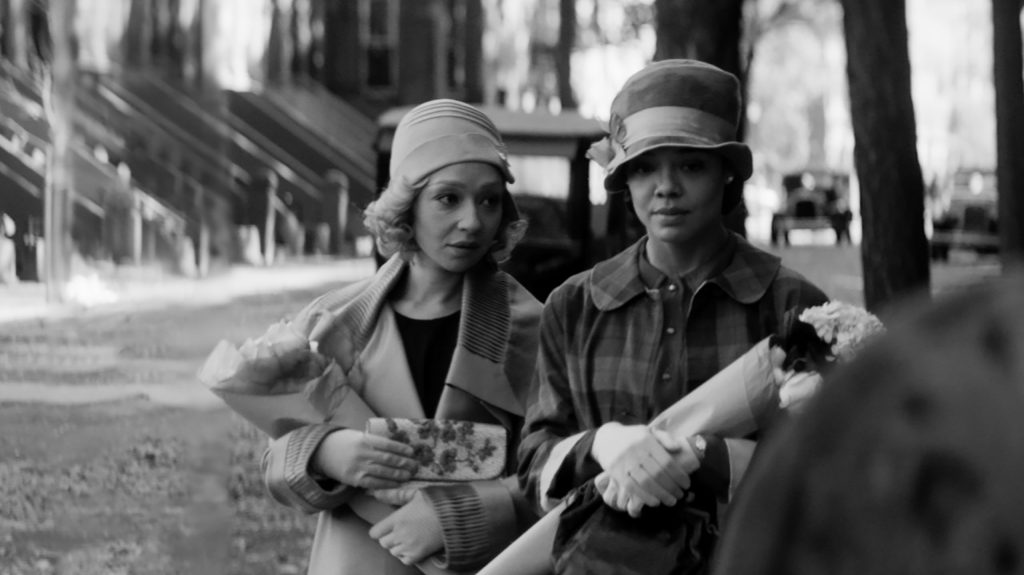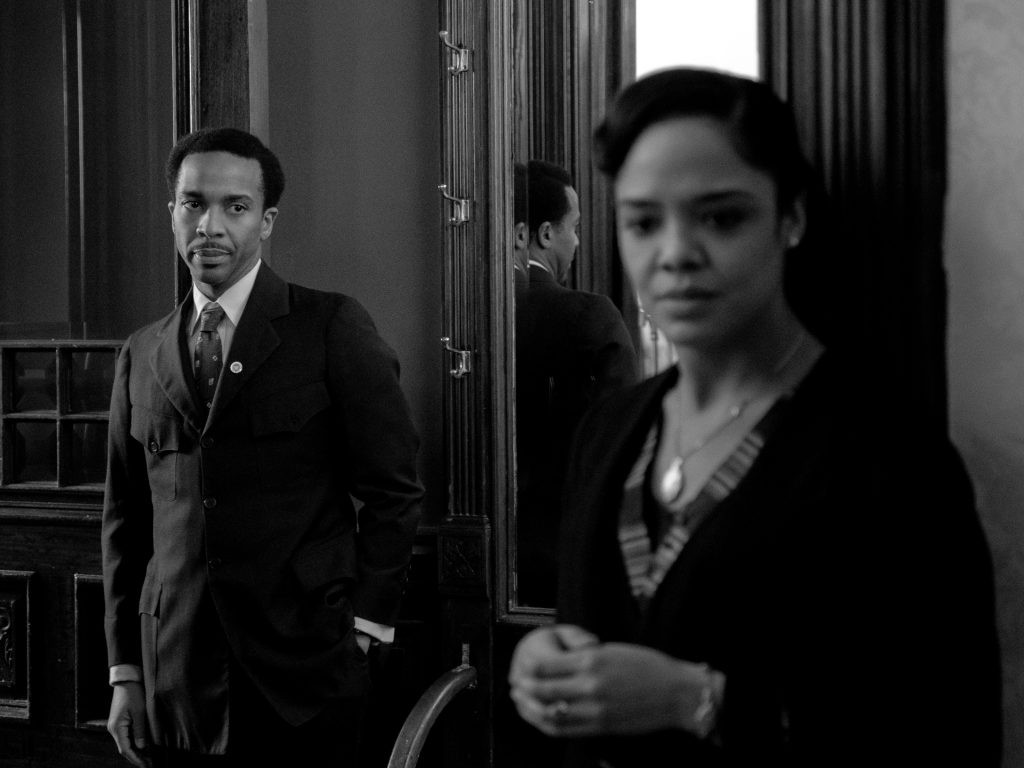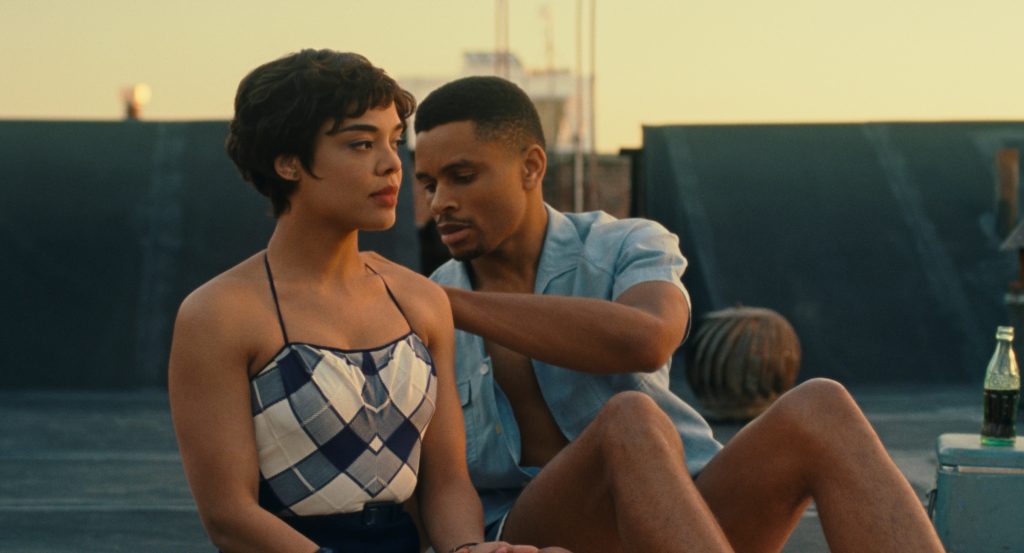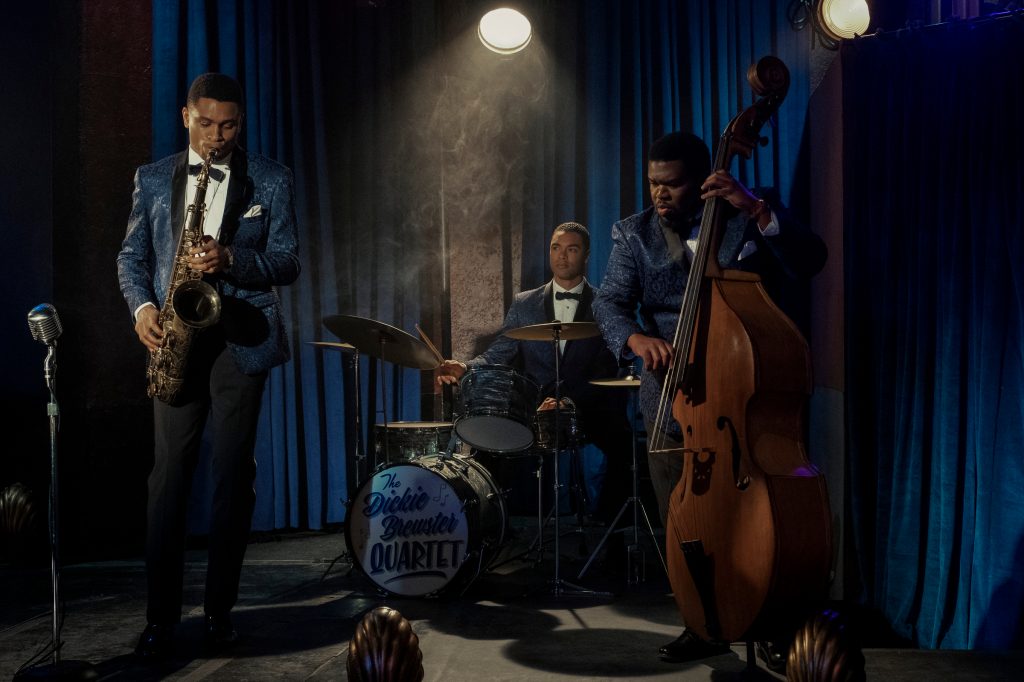February 23, 2023
by Carla Hay
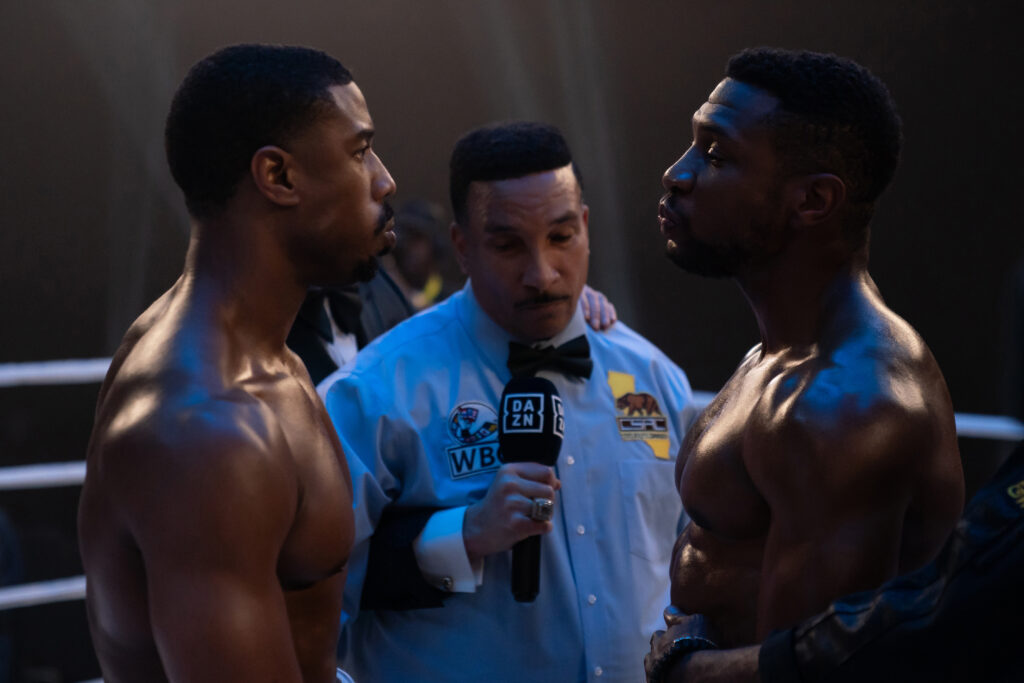
Directed by Michael B. Jordan
Culture Representation: Taking place in the Los Angeles area in the early 2020s (with flashbacks to 2000 and 2015), the dramatic film “Creed III” features a predominantly African American cast of characters (with some white people and Latinos) representing the working-class, middle-class and wealthy.
Culture Clash: Retired boxing champ Adonis “Donnie” Creed comes out of retirement to fight his former childhood friend Damian “Dame” Anderson, who has a jealousy-fueled vendetta against Adonis.
Culture Audience: “Creed III” will appeal primarily to people who are fans of the “Creed”/”Rocky” franchise, the movie’s headliners, and boxing movies that show the emotional toll of keeping dark secrets and the down sides of fame and fortune.
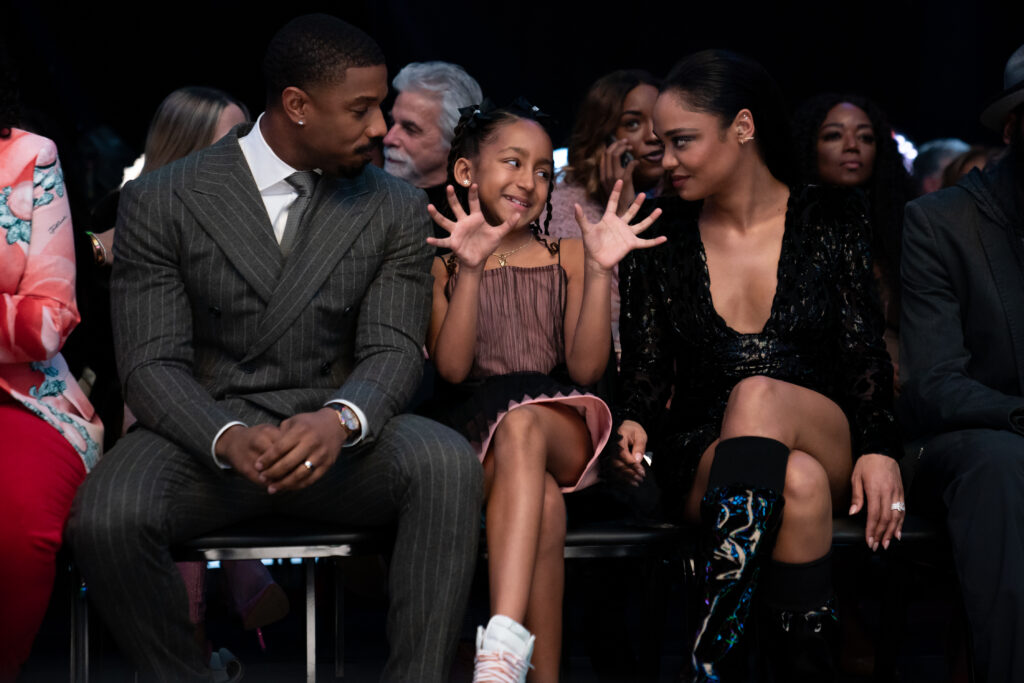
“Creed III” serves up more of the franchise’s winning combination of family drama, boxing fights and friendship loyalty. The movie might disappoint viewers who are expecting more boxing scenes, but Adonis Creed’s complicated past gets a worthy spotlight. Michael B. Jordan, who stars as Adonis “Donnie” Creed, makes an impressive feature-film directorial debut with “Creed III,” a movie that is the most psychologically intricate movie in the “Creed” franchise so far. Fans of boxing movies should know in advance there’s a lot more talking than boxing action in “Creed III,” which has only three big boxing matches and several flashbacks to Adonis’ childhood.
The “Creed” franchise (a spinoff from the “Rocky” movie franchise) began with 2015’s “Creed” and continued with 2018’s “Creed II.” With “Creed III,” the filmmakers (including “Creed III” screenwriters Keenan Coogler and Zach Baylin) give a lot of screen time to Adonis’ backstory to explain why he is so conflicted when a former childhood friend shows up in Adonis’ life again after the friend spent 18 years in prison. It helps (but it’s not essential) to see the previous “Creed” movies before seeing “Creed III,” because these previous movies give better context to Adonis’ relationship with his loyal wife Bianca Creed (played by Tessa Thompson) and their daughter Amara Creed (played by Mila Davis-Kent), who both happen to have hearing disabilities.
“Creed III” (which takes place in the Los Angeles area) begins with a flashback to 2000, when 15-year-old Adonis (played by as Thaddeus James Mixson Jr.) was a foster kid getting caught up in a lot of shady activities. At the time, Adonis’ best friend was 18-year-old Damian “Dame” Anderson (played by Spence Moore II), whom Adonis admired immensely. Adonis and Dame have a younger brother/older brother type of relationship. But they both run with a rough crowd and spend a lot of time doing risky, illegal activities. Dame was the first person who taught Adonis how to be a boxer.
One night, Adonis sees a middle-aged man named Leon (played by Aaron Alexander) outside of a liquor store. Dame is somewhere nearby. Leon looks intoxicated and oblivious as he walks by Adonis, as if he didn’t really see Adonis at all. Adonis angrily says to Leon, “You don’t remember me, do you?” And the next thing you know, Adonis attacks Leon and starts beating him viciously.
What happened that night is shown in other flashbacks that eventually reveal the entire story. It’s enough to say that what happened that night drastically changed the courses of Adonis’ life and Dame’s life. And it’s something that Adonis wants to forget, but he will have to face it when Dame suddenly and unexpectedly comes back into Adonis’ life, after Dame (played by Jonathan Majors) has spent 18 years in prison. Dame reconnects with Adonis the week after Dame got out of prison.
As already revealed in the “Creed III” trailer, the reunion of Adonis and Dame becomes a rekindled friendship that turns sour and leads to Adonis and Dame facing off as enemies inside and outside the boxing ring. The rift in their rekindled friendship happens about halfway through the movie. People who see the “Creed III” trailer before seeing the movie might wonder why it takes so long to get to the conflicts between Adonis and Dame.
For better or worse, “Creed” (which has a total running time of 116 minutes) takes its time in exploring issues such as urban poverty, social class prejudices, and African American male experiences in friendships, rivalries and the criminal justice system. It’s a lot of issues to cover, in addition to bringing back previous “Creed” movie characters and their storylines, introducing new characters, and showing a different side of Adonis without fundamentally changing who he is. Fortunately, the writing, directing, and film editing (by Jessica Baclesse and Tyler Nelson) of “Creed III” blend everything together in a way that’s seamless but a little long-winded.
After “Creed III” begins with flashbacks to Adonis’ life in 2000 (when he was 15 years old), the movie shows a flashback to 2015, when a 30-year-old Adonis won his first heavyweight boxing championship. In 2023, Adonis is happily retired, wealthy, and running a boxing training center called the Delphi Academy with Tony “Little Duke” Burton (played by Wood Harris), who has a shared generational history with Adonis. Little Duke was Adonis’ former cornerman, just like Little Duke’s father Duke was a cornerman for Adonis’ father Apollo Creed, Rocky Balboa’s most famous boxing competitor from 1976’s Oscar-winning “Rocky” and 1979’s “Rocky II.”
When Dame comes back into Adonis’ life, Dame makes Adonis feel guilty for Adonis not keeping in touch with Dame while Dame was in prison. Before he was sent to prison, Dame was a Golden Gloves (amateur boxing) champ, and he’s bitter that his boxing career was cut short because of his prison sentence. Now in his early 40s, Dame is considered too old to try to become a professional boxer, but he tells Adonis that it’s his goal anyway. Dame convinces Adonis to let Dame train at Delphi Academy.
Two people are very wary and skeptical about Dame being back in Adonis’ life, because they don’t think that Dame can be trusted. The first skeptic is Little Duke, who thinks that Dame is a loose cannon who fights dirty in the ring. Little Duke also thinks it’s foolish to invest time and money in Dame’s training. Dame is unemployed and broke when he gets out of prison, so Adonis is essentially paying for all of Dame’s boxing expenses.
The other person who doesn’t trust Dame is Adonis’ stepmother Mary-Anne Creed (played by Phylicia Rashad), Apollo’s widow who took 23-year-old Adonis out of a detention center in 1998 and let him live with her in her Bel-Air mansion. Adonis’ biological mother, who died when he was a child, was Apollo’s mistress. As shown in the first “Creed” movie, Mary-Anne and Adonis became so close, she began to treat him like he was her own biological son, and he eventually started calling her his mother.
Mary-Anne knows about Adonis and Dame’s shady past together, and she thinks of Dame as a bad influence, then and now. Soon after Dame and Adonis reconnect, Dame asks Adonis if Adons received any of the letters that Dame wrote to Adonis during Dame’s prison term. Adonis said he never got the letters, which were sent to the mansion where he used to live with Mary-Anne. It’s very easy to figure out what happened to those letters.
Adonis is a mentor to the current world heavyweight boxing champ: Felix Chavez (played by Jose Benavidez), who is managed by his outspoken mother Laura Chavez (played by Selenis Leyva), who is as ambitious and hard-working as her son. Felix’s biggest challenger for the heavyweight title is Viktor Drago (played by Florian Munteanu), who was Adonis’ main opponent in “Creed II.”
Viktor has a small but pivotal role in “Creed III.” Viktor, the son of notorious Ivan Drago (who fought Rocky in 1985’s “Rocky IV”) is supposed to be face off with Felix in a high-profile world heavyweight championship boxing match. However, something happens that prevents Viktor from doing this boxing match. What happens after that changes the trajectory of Dame’s boxing career and leads to the downfall of his friendship with Adonis.
Jordan (who is also a producer of “Creed III”) gives his best performance so far as Adonis in a “Creed” movie. It’s a richly layered performance that looks authentic and well-earned, after years of Jordan portraying this character. Thompson is very good in her role as Bianca, but she has a lot less to do in “Creed III” than she did in “Creed” (which showed the Adonis/Bianca courtship) and “Creed II,” which showed the early years of their marriage and the birth of Amara.
As the troubled and emotionally wounded Dame, Majors brings realistic nuances to this role that don’t make him a typical “villain” in a boxing movie. Dame is a product of his poverty-filled environment and of his personality. He can be intensely loyal, but he can be intensely vengeful. He’s also a messy cauldron of angst, pride, sadness and vulnerability. On the one hand, Dame still wants a friendship with Adonis. On the other hand, he’s jealous of Adonis, who has the fame and fortune that Dame thinks could have been Dame’s too.
Both men have used boxing as a way to cope with tough circumstances and their life problems, but the movie shows how Adonis’ status as a celebrity millionaire does not protect him from his past or how he is viewed in the world as an African American man. Adonis is a role model now, but he knows that things could have turned out very differently under other circumstances. Meanwhile, Dame’s prison record as a convicted felon automatically makes him a society outcast in some ways, by making him unable to vote and get certain jobs.
Adonis and Dame started out with similar lifestyles, but their current social class divide (and Dame’s envy about it) is shown in telling scenes. Dame and Adonis have their first reunion meal at local diner in a low-income neighborhood that the two used to frequent when they were teenagers. Dame comments to Adonis, “I’m surprised you’re still here with the common folk.”
Later, Adonis invites Dame to the mansion were Adonis lives with Bianca and Amara. Dame seems both impressed by and jealous of Adonis’s privileged and happy life. It further fuels Dame into thinking that he was robbed of having this type of life because of what happened that fateful night in 2000. Dame insists that Adonis should help Dame get a shot at winning a boxing title.
As for Amara and Bianca, they’re not exactly sidelined, but their storylines in “Creed III” are secondary to what’s going on between Adonis and Dame. Amara is a singer/musician who has successfully transitioned from being a performer to being a music producer because of her partial hearing condition. Amara mentions how painful it was for her to give up performing on stage, but her feelings about this issue are never fully explored in “Creed III.”
Amara is a lively and intelligent “daddy’s girl,” who eagerly learns how to box and takes Adonis’ self-defense advice to heart. The movie has multiple scenes of Amara doing shadow boxing training with Adonis. It all seems like a blatant set-up for a future “Creed” movie about Amara when she’s an adult and inevitably becomes a boxer. Someone call Laila Ali (daughter of Muhammad Ali) for advice.
Amara’s fight skills cause problems when Amara punches a girl classmate who bullies Amara by stealing a drawing that Amara made and ripping up the drawing in front of Amara. A parent-teacher meeting about this fight shows the different parenting styles of Adonis (who doesn’t have a problem with what Amara did) and Bianca, who does have a problem with it. Bianca feels that she has to be the parent to teach Amara that throwing punches isn’t always the best way to resolve a fight.
There’s also friction between Bianca and Adonis later in the movie, because he won’t open up and tell her all the details about what happened in the incident that landed Dame in prison. This incident is the root cause of all the hard feelings between these two on-again/off-again friends. Previous “Creed” movies only hinted at Adonis’ difficult past. “Creed III” is a deep dive into it.
Is this a psychological drama or a boxing movie? It’s both. The boxing scenes are adrenaline-packed and thrilling, of course, but “Creed III” is also concerned with showing how fame and fortune can affect relationships but can’t change the past and can’t change how people fundamentally feel about themselves. It’s a hard lesson that Adonis has to learn, even if it comes at a painful cost of having a friend turn into an enemy. “Creed III” is by no means the end of the “Creed” franchise, but it does close a chapter on Adonis’ toughest fight of reconciling his past with his present.
Metro Goldwyn Mayer Pictures will release “Creed III” in U.S. cinemas on March 3, 2023.

